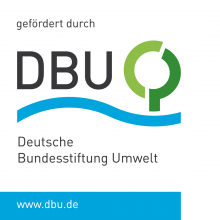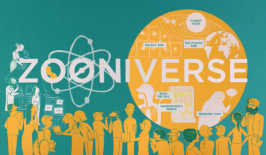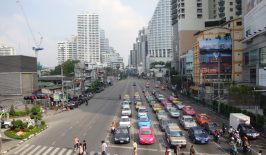Geraldine de Bastion is all about the intersection of digitisation, human rights and tech innovation. She is co-founder and CEO of the Berlin-based agency Konnektiv, which advises on the use of digital media and the use of new and open technologies, primarily in international cooperation but also in other policy areas. With Global Innovation Gathering, she has also built up a network of various innovation hubs, i.e. physical locations in almost all continents where digital innovations are created. And if you’re a regular visitor to re:publica, you may have seen her on stage before, because de Bastion is not only part of the program and organisation team, but also moderates the stage.
In this interview, we talk to her about how she herself came to be involved with civic tech, what she understands by it, and what opportunities and challenges digital civic engagement brings, specifically in environmental and climate protection.
Geraldine, how did you get involved with civic tech?
I was studying political science and walked into a freshman lecture at the time. There were 2,000 other people sitting there. It was the first time in my life – and maybe the last time – that I thought about strategy. I realised that everyone would also be applying along with me when I got out. And I thought that I needed a theme, a niche, something that not everybody else was doing. And then somehow that came together, that I had a friend who had been editing student and youth magazines for a long time, and my interest in the human side of digitisation. In 1998, we founded an association called Narra, and we wanted to network and digitise various youth media in Berlin for the first time. To do that, we coded a platform – long before there were blogs like that – digitised youth media and offered training for young people on how to publish on the Internet. And then I just kept thinking about how to use the Internet for civic and social engagement.
When people think about civic tech, the term is often used in very different ways. What do you mean by it?
I think there are different interpretations of the term, and new terms keep coming up as well, because the digital world is just very agile. I would define civic tech as the use of digital means and tools for civic and citizen engagement. How do people use digital communication channels, how do people use different technologies to shape democratic and civic processes and to get involved – by citizens for citizens or also in interaction with governments.
I think that civic tech has become a trendy term recently. Government organisations in particular have realized that civic tech can of course also be used to involve citizens in political processes again and to reduce this famous disenchantment with politics. The term Gov Tech has also been added, as a kind of co-counterpart to the term Civic Tech, which is about how administrative units and government organisations can use digital tools and resources to make themselves more accessible. There were a lot of new things being tried out last year to do that, for example, in the think tank that was initiated by the Ministry of Labor. And I was also able to participate in the “Together it’s AI” competition, which is all about promoting nonprofit-oriented developments in the field of AI.
So using technology to create interfaces between citizens, civil society, companies and governments – is that the core of civic tech?
I would say yes. And then there’s also the question of how new interfaces can be created as a result. Firstly, between communities themselves, but also between communities, government and administration. And the question of how we can open up processes through digitisation and involve more people, how we can bring about more intensive, joint work between people and key organisations. That’s just as important in the political sphere, of course, as it is in academia and research.
What role does open data play in this, or the whole open source idea in general?
Much of the civic tech that has emerged in recent years is the result of civic engagement that attempts to digitally interpret fundamental democratic values, which is why there is a strong interconnection between open source and civic tech. Because many of these approaches are based on common values – such as openness and transparency. This can also be seen in organisations that develop civic tech in Germany, such as the Open Knowledge Foundation or the Prototype Fund. Most open data initiatives are initiated by people who say, “Hey, maybe we can also think about data, let’s see what exciting data governments have, whether we can open it up and do something with it.”
At the same time, there is a growing awareness on the government side to open up the data and make it available to citizens, partly because the pressure is growing. I see this especially at the city level, because in Berlin, for example, I’m on board in the City Lab. But citizens are also becoming more aware of how data should be handled.
So there is definitely a growing interest in civic tech projects in Germany. What does that look like in the European or global context?
Overall, the developments are similar to those in Germany. Of course, there are also countries that have dealt with the issue differently in recent years, for example Estonia. This small country has led the way in digitisation, and open data has long had a completely different status there. There are crazy statistics on how effective these measures have been. Their Open Data portals are now, in the second generation so to speak, being used with a new awareness in a truly public benefit oriented way. Because in Estonia, it’s been shown that it’s mainly corporations and commercial startups that benefit from data that’s put completely openly on the web. And the things that come out of it are more commercial than public interest-oriented solutions. This is simply due to the innovative power of the companies that can make this data their own and use it. For example, when certain mobility data sets are published, it’s usually commercially oriented startups that do it, because non-profit initiatives or associations are slower or lack the innovative power. But the desire is actually for public benefit-oriented applications to emerge from the data sets.
But how do we get open data to be used primarily for public benefit applications?
Many different digital rights organisations and thought leaders are thinking about graduated data use concepts, so that public interest-oriented solutions are preferred and have different access to the data sets that are no longer completely open, but are still open in principle. Instead of saying everything is simply open, there are then just different approaches.
Such data trust stewardships, i.e., that intermediate instances are created, and how these can then be designed and who can take on stewardship roles, that is all still under development. There are increasing dialogs going on where such concepts are being discussed together with government organisations. At the national and European level, we’re still in the early stages, but there are a lot of things happening. And there are great projects that have developed a fantastic treasure trove of open source foundations for this, such as the DECODE project from Barcelona and Amsterdam, which are also developing civic tech platforms through which decisions and consultation processes can be made with citizens. So really an open source toolset for civic tech management. And here, they have already dealt with such data concepts and developed approaches that are, of course, being further considered by other cities.
You mentioned many examples that start with democratic processes. What do you think civic tech solutions can do to help us tackle the climate crisis?
On the one hand, I think there are tasks that should definitely be carried out by the state. First and foremost, this includes infrastructure development, because modern infrastructures are also climate-protective. The 5G mobile communications standard, for example, transmits the same amount of data with almost 80 percent less energy. So far, unfortunately, there has been no sensible acceptance of responsibility in Germany.
And then it’s a question of how we can put pressure on our government to live up to this responsibility. There have been many nice developments in recent years where new alliances have simply been created. From a digital activist perspective, I think there’s been a very big concern on both sides. We see many of the issues that we work on as intersectoral issues that address basic democratic values, and that’s why we would like to see collaboration with other movement organisations. The merging of digital civil society with climate and environmental protection organisations has been a very important factor. When united, it is now harder to play one off against the other.
The negative digitalisation, including negative blockchains, energy consumption … With these concepts, it’s easy to bring a division into this form of civic engagement, although from my point of view they ultimately belong very, very closely together and it’s important to think about these two policy worlds together.
It’s great to see how, for example, through the Bits and Trees network, other initiatives have also continued to expand these interfaces and these movements continue to grow together.
Why do civic tech approaches and the climate movement belong closely together for you?
I think we’re very close, because we don’t want a controlled surveillance society, nor one where people can no longer live safely because the air is no longer breathable or the climate is no longer bearable. To me, those have always been very related concepts when you’re working for a better future for this generation and the next.
The other aspect is that digitalisation is of course changing all areas of our society and we often give in to this feeling of powerlessness, as if it’s something that just happens to us. But I think that everyone who sees themselves as part of the digital activist circle understands digitisation as something that we can shape and form. And that’s why, of course, we can use these technologies to shape the future. And that includes using digitisation to drive climate protection forward and to work for an environment worth living in. There’s already a lot being tried out, experimented with and tested – and there’s so much more possible.
Do you have any favorite projects that are using civic tech in climate action?
There are so many! Just last year, probably also because of the coronavirus pandemic, there was a boom. In Berlin, we had the Energy Hack, which was that’s not the best project ever, but it illustrated how actors can come together to really think of things together. There was the Code for Climate, which also ran via Code for Germany, and many smaller smart city projects, such as “Gieß den Kiez” in Berlin, an application that shows which trees in the neighborhood should be watered. And then, as a citizen, you can go and water a tree there. Of all the smart city projects, this may not be the greatest, but it shows the huge range of innovations that are taking place right now.
But it is also very exciting to see things that are perhaps not yet explicitly presented in this interface. We recently had a workshop in which the founder of Code for Japan made a strong case for the use of open source technologies in administration and government in a presentation and gave some nice smaller examples. Some of them were projects that emerged from the DECODE project. And that’s exactly how you can see how resource-efficient the open source approach is. You don’t have to reinvent the wheel over and over again, but can use things, adapt them to different places and thus save resources and development costs and have the possibility to use global networks.

What are the biggest challenges of civic tech solutions?
Well, there are several very big hurdles that have also been around for a very long time. First and foremost is funding, because there are simply very few ways to get civic tech and open source solutions funded. The Prototype Fund is a great take, but it also only funds software development and not hardware development, for example. Furthermore, it is also only really very local.
But because these are global problems, I think it would be important to also fund global developments and solutions in this area. But we are very dependent on very few funding sources, such as the Open Tech Fund or the Source Foundation from the USA. In Europe, there is no fund for civic tech initiatives and follow-up funding and organisational funding, i.e. funding that is not only project-based, is even completely impossible.
Related to this is the problem of scaling, also especially in Europe due to our different language contexts or different cultural areas. There are still very few European civic tech initiatives. That’s a pity – especially at a time when we would do very well to maintain this European idea, fill it with life and perhaps also accompany it with tools so that new connections can emerge.
In any case, another hurdle is the overwhelming power of the large corporations, which makes it difficult for other public-interest organisations to build anything else or to play along at all. From a technical perspective, I see that as the core problem. And it’s really something that I experience every day in my own day-to-day life, for example, every time I think about sharing information with Google. I actually want to get that information out to the general public and engage with civic tech, but I don’t want Google to profit from it. Of course, I can put some things on Open Street Maps, but there is such a massive push-out of these solutions, even just in the public sector. It’s also similar with school clouds. Alternative platforms are not as reliable (yet), and commercial platforms have been faster.
How great would it be if we had other forms of public, collective knowledge like Google, in addition to Wikipedia, where this knowledge actually benefits the general public and even more citizens feel like sharing their knowledge and getting involved collectively.
And how can we get to the point where such cooperative solutions are really implemented by citizens and not by individual companies?
Expropriate! (laughs) Yes, I think so. The lobbying power of these platforms is so great that there is very, very little room for thought. Of course, I would like to see a world in which there are cooperative platform solutions.
I believe that this is all actually feasible and also conceivable, that there are models that make something like this which are usable and financially viable. I see this time and again in Germany, where we are massively promoting this European third way, but no one dares to come up with their own, new platform models. And then this feeling of powerlessness arises again.
How can we motivate people to become actively involved in digital development processes?
The key word, of course, is digital education – teaching people how to handle their own data. One way to do this would be to introduce digital ethics and digital design as a subject of instruction across the board. Where we simply learn a less consumer-oriented approach to media and people can set up their own digital projects as early as school age. For me, too, this experience was so important to set up my own initiatives. Not that I can really code now, but you get an awareness of what you can do with it yourself.
So how can we use civic tech tools to get things moving on the climate issue? Where should we start?
Maybe I’ll start with a few things that aren’t necessarily unique to civic tech, but are essential here as well. One issue we mentioned earlier, funding. Personally, I think it would make a lot of sense if we link certain values together and target funding to that, as is done, for example, through the Prototype Fund. And if we put government investment into startups, for example, why shouldn’t it per se go to companies that are committed to climate protection, social cohesion and gender equality?
The second is the issue of Open Data. There should be a global initiative that provides data needed for climate protection and makes it globally usable. And of course this should be guided by the idea of how the communities that are also affected by this can be involved in the first place and how cooperation can be established.
For me, this also includes obligations for the economy to participate, for example through data sharing agreements, and to make the corresponding data usable for the common good. I think these are all regulatory issues where there should be very clear guidelines and priorities, which we have to some extent, but so far neither systematically nor across the board.
It is a joint task, and we so often see responsibility being shifted to actors who are involved on the civil side. And I think it is very important that we see where the responsibilities lie in this area. This is also a core aspect of civic engagement, namely to make other actors aware of their responsibilities.
Thank you very much for the interview, Geraldine!
This article is part of our Special Feature “Civic Tech – Ways Out of the Climate Crisis with Digital Civic Engagement”. You can find all articles of the Special Feature here: Special Feature Civic Tech

The Special Feature is part of the project funding of the German Federal Environmental Foundation (Deutsche Bundesstiftung Umwelt – DBU), in the framework of which we are producing four special features over two years on the topic of “Opportunities and potentials of digitalisation for sustainable development”.
More information here.
This article is a translation of an original article from the RESET German language website.








